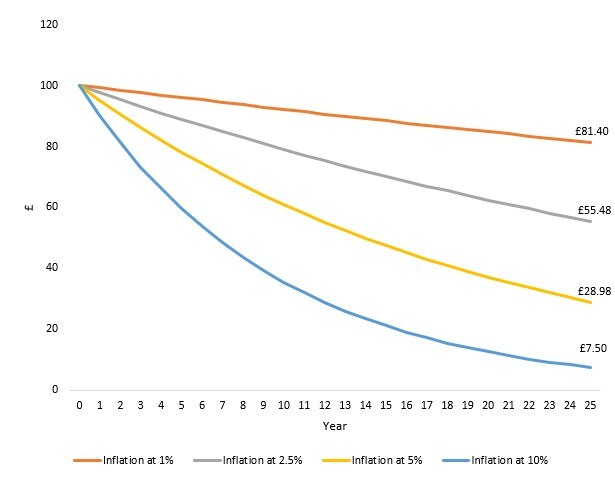Navigating the cost-of-living squeeze
Charity financial management Views & insightsVicky Eastwood, Charity Investment Manager at RBC Brewin Dolphin, explores how trustees can mitigate the impact of high inflation on their charity’s reserves.
22 March 2023 | 3 minute read
Charities are in the midst of one of the most challenging periods that many of us in the UK have ever witnessed.
The cost-of-living crisis means demand for services is at a high, many donors are reining in their spending, and rampant inflation is increasing the cost of charities’ operations.
The latest figures from the Office for National Statistics show UK inflation, as measured by the consumer prices index (CPI), rose by 10.4% in the 12 months to February 20231. There were particularly steep increases in prices for electricity, gas and food – components of inflation that disproportionately affect low-income households (the primary beneficiaries of many charities’ services).
As well as seeing increased demand for services, charities themselves are struggling with soaring food and travel costs, as well as expectations from employees that their wages will increase to compensate for inflation. Known as wage inflation, a shortage of workers in some areas is making this even more acute. For charities, wage inflation is particularly challenging as employees across the board are being attracted by higher salaries elsewhere.
Measuring the cost of inflation
While many of these challenges are outside the realm of an investment manager, what we can do is help charities look for ways to mitigate the impact of soaring costs on their long-term objectives. Trustees have a duty to protect the real value (‘purchasing power’) of their charity’s reserves, but inflation can severely erode the real value of cash savings over long periods.
Although interest rates are rising, at a faster rate than they have for many years, they remain below the current rate of inflation. RBC Brewin Dolphin’s own research shows the impact of leaving £100 in a cash savings account paying interest of 1.75% over 25 years. An annual inflation rate of 2.5% would see its real value decline to £55.48 over the period, while a 5% rate would see its real value drop to just £28.98.
Impact of inflation on ‘real’ value of cash

Source: RBC Brewin Dolphin. For illustrative purposes only. Based on interest rate of 1.75% per annum.
For trustees, it may be worth considering whether part of the cash reserves could be invested with the aim of generating a better return than cash over the long term.
Investing part of your charity’s cash reserves isn’t a decision to be taken lightly and the impact of high inflation may mean that higher levels of cash are required following review. While history shows that investing typically offers better returns than cash over long periods, assets can be subject to fluctuations in value along the way, which might not be suitable for all charities. However, for those who can take a longer-term view with a portion of their reserves, it is worth looking for ways to mitigate the risk of inflation.
Some of the points to discuss and review regularly with your investment manager include:
- The charity’s overall investment policy and objectives.
- How to achieve the right balance between risk and return and aligning this with your reserves policy and ‘pots’.
- Whether to adopt an ethical, socially responsible or mission/purpose related approach.
- Investing any permanently endowed funds in a way that benefits both short-term and long-term aims.
- Potential tax implications.
Is now a good time to invest?
Investing your cash reserves may seem counterintuitive when economists are warning of a year-long recession in the UK. With economic growth slowing, interest rates rising and consumers experiencing a cost-of-living squeeze, it could be wise to adopt a more cautious stance. However, it’s important to bear in mind that markets are forward looking and that some of the bad news – particularly rapid interest rate increases – has already been priced in to equity valuations. While volatility in financial markets is unnerving, it has created an opportunity for charities who can afford to take on investment risk to phase funds in.
Having been absent for many years, inflation is back with a vengeance, and it looks like it will be with us for some time to come. The sooner trustees consider its implications and what they might be able to do to offset its effects, the better positioned they will be to deal with it. Investment may not be for all charities, but in an environment where it is more important than ever to make the most of reserves, it is certainly worth considering. Even if the decision is made not to invest, trustees will have been through the due diligence process and will know that it is not right for them at the current time.
The value of investments, and any income from them, can fall and you may get back less than you invested. This does not constitute tax or legal advice. Tax treatment depends on the individual circumstances of each client and may be subject to change in the future. Neither simulated nor actual past performance are reliable indicators of future performance. Information is provided only as an example and is not a recommendation to pursue a particular strategy. Information contained in this document is believed to be reliable and accurate, but without further investigation cannot be warranted as to accuracy or completeness. We will only be bound by specific investment restrictions which have been requested by you and agreed by us. Opinions expressed in this publication are not necessarily the views held throughout RBC Brewin Dolphin. Forecasts are not a reliable indicator of future performance.